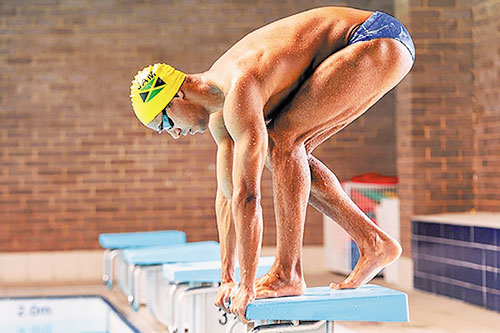Leyna Bloom Sports Illustrated cover shoot from Instagram
Leyna Bloom is first ever Trans cover for Sports Illustrated swimsuit issue
From staff reports
NEW YORK — Leyna Bloom, a 27-year-old Chicago native, who identifies as Black and Filipina, reflected on her Instagram account Monday of being the first Trans woman of color on the cover of the venerable Sports Illustrated swimsuit issue saying. “This moment heals a lot of pain in the world.”
The news first broke in June during Pride month, speaking to NBC News OUT who noted that model and actor had previously broken through barriers as a transwoman when in 2017, she became the first trans woman of color to be featured in Vogue India, and in 2019, she became the first to star in a film that premiered at the Cannes Film Festival for her appearance in “Port Authority.”
“These are huge moments,” Bloom told NBC News at the time. “But it’s just like, why has it taken so long?”
In her Instagram post Bloom wrote, “We deserve this moment; we have waited millions of years to show up as survivors and be seen as full humans filled with wonder.
I’m am so happy, honored, and humbled to share that I’m the 1st trans woman to grace the cover of Sports Illustrated! Thanks so much @mj_day & @si_swimsuit team for recognizing the importance of representation; this is all of our responsibility. Thank you @joshrotten@caafashion and most importantly @damianbao for taking a CHANCE on me. My friend & teacher @modelthaddeus thank you for helping me make this possible.
To my bloodline and father, thank you for the courage & sacrifices you made to ensure that I stand tall in every step I take. Now I’m flying.”
Chilean Senate approves marriage equality bill
By Michael K. Lavers | Washington Blade
The Chilean Senate on Wednesday approved a bill that would extend marriage rights to same-sex couples.
The vote took place less than a month after President Sebastián Piñera announced he supports marriage equality and urged lawmakers in the South American country to quickly act on the issue. The bill now goes to the Chilean House of Representatives.
Same-sex couples have been able to enter into civil unions in Chile since 2015.
The Movement for Homosexual Integration and Liberation, a Chilean LGBTQ advocacy group, in 2012 filed a lawsuit with the Inter-American Commission on Human Rights on behalf of three same-sex couples who were seeking marriage rights in the country. The group entered into an agreement with the Chilean government over marriage equality and adoption rights for same-sex couples, but withdrew from it last October.
Out athletes going for gold
By Kevin Majoros | Washington Blade
The 2020 Tokyo Olympic Games begin on June 23, with competitions continuing through Aug. 8. The Games were postponed in March 2020 as a result of the COVID-19 pandemic.

Michael Gunning narrowly missed out on qualifying for this year’s Olympic Games.(Photo courtesy Gunning)
For many aspiring Olympians, the quadrennial event is the culmination of a lifetime of sacrifices to compete against the best athletes in the world while representing their country on an international stage.
The road to get there is filled with obstacles and this Olympic cycle produced one more barrier in the form of training disruptions that happened in almost every sport.
After all the dust settled during the qualifying process, 627 athletes were named to Team USA. More than 30 of those athletes are out members of the LGBTQ community.
Regarding the other countries competing, according to a recent story by Outsports, “At least 142 publicly out gay, lesbian, bisexual, transgender, queer and nonbinary athletes are headed to Tokyo for the Summer Olympic Games.”
Flashback to the 2016 Rio Olympic Games when a correspondent from The Daily Beast used hook-up apps such as Bumble, Tindr, Grindr, and Jack’d to message gay athletes. His published story went on to describe the athletes, creating potentially dangerous situations for the athletes from countries with high anti-LGBTQ violence rates.
What should we expect from the environment in Japan?
There have been a handful of Japanese athletes who have come out recently but for the most part, they are competing in other countries — notably trans soccer star Kumi Yokoyama who plays for the Washington Spirit and out lesbian Shiho Shimoyamada who plays soccer for SV Meppen in Germany.
LGBTQ activists in Japan were hoping that the worldwide attention on the Tokyo Olympics would help push their ruling Liberal Democratic Party to pass EqualityAct Japan banning discrimination against LGBTQ people. Their legislature went into recess without passing the measure.
That setback did not stop Pride House Tokyo Legacy from opening in October 2020 in Shinjuku, Tokyo. It will serve as a permanent LGBTQ support center where individuals can feel safe and at home.
Pride House Tokyo Legacy has been authorized as part of the Tokyo 2020 Official Program by the Tokyo Organizing Committee of the Olympic and Paralympic Games along with full support from the International
Olympic Committee. Those endorsements make it the first Pride House worldwide to achieve this status.
Visibility for the LGBTQ community is important for a variety of reasons and in the sports world, we tend to point to LGBTQ athletes as role models for younger generations.
Over the next few weeks we will bear witness to the first transgender athlete to compete in Laurel Hubbard as a weightlifter for Team New Zealand.
We will watch lesbian triple jumper Yulimar Rojas compete and carry the flag for her country of Venezuela in the Parade of Nations.
And we will sit enthralled as gay British Olympic diver Tom Daley is cheered on by his three-year-old son Robbie as he attempts to medal again in his fourth Olympics.
The last time the Blade checked in with out Tongan swimmer Amini Fonua, he was in heavy training to qualify for the 2020 Tokyo Olympics and struggling with the funding needed to complete that journey.
Fonua was one of the Olympic athletes that spoke out against The Daily Beast story from 2016, which helped to get the story retracted, with an apology. It was the first instance where the International Olympic Committee, which also chimed in, had ever acknowledged an LGBTQ presence.
Pakistan opens government school for transgender students
By Brody Levesque | Washington Blade
MULTAN, Punjab, Pakistan — In an action that sets unique precedent in this largely conservative Muslim majority country, the Government of Pakistan earlier this month established and opened its first public school for transgender people in Pakistan’s most populous province.
A tweet sent out on July 9, on the official Pakistani Government Twitter account read; “First public school for transgender people has been opened in Multan. This will not just educate the transgender people but will increase livelihood and business opportunities for them as well.”
The school, established by the educational department in Punjab province, where Multan is located, opened its doors on the first day of school with 18 students enrolled the Associated Press reported.
“We have provided them everything that is required” for their schooling, tweeted Murad Rass, Punjab’s education minister. He added that he hopes that the school will help transgender youth get better job opportunities later on in life.
Ayesha Mughal, a trans advocate in Punjab, told the Associated Press that the trans community is “grateful” to the government for opening the school and “for providing free education to our community.”
Mughal tweeted about the historic occasion. “Today I am so happy, proud and emotional at the same time.”
Life in Pakistan for trans people is often fraught with the danger of being physically assaulted, denied basic healthcare, and exclusion from society. Often forced to live on streets reduced to begging for food or everyday necessities, the opportunity presented for good education is a lifeline to many trans Pakistanis.
In 2018, the country’s Parliament passed the Transgender Persons (Protection of Rights) Act which established broad protections for trans people in the country which was followed in 2019 by the Pakistan Supreme Court which ruled transgender people would be designated as a third gender.

